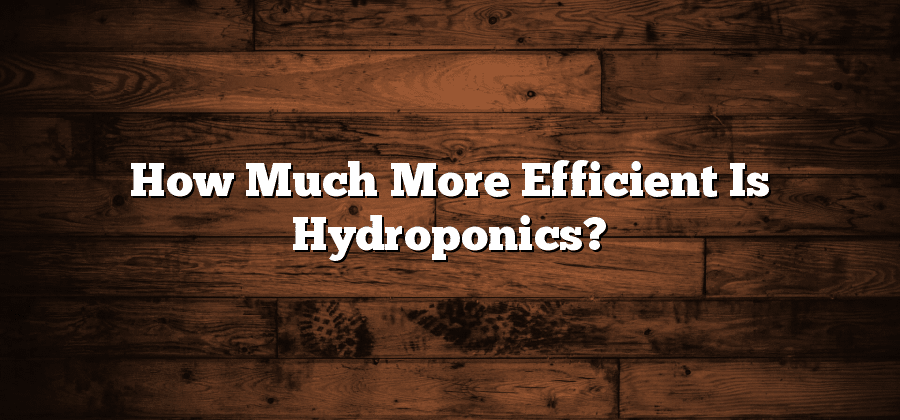Benefits of Hydroponics in Agriculture
Hydroponics, a method of growing plants without soil, has shown numerous benefits in the field of agriculture. One of the major advantages is the ability to control and optimize nutrient levels for plant growth. In traditional soil-based agriculture, plants often struggle to absorb enough nutrients from the soil, leading to stunted growth and lower crop yields. However, with hydroponics, plants are provided with a precise and balanced nutrient solution, ensuring that they receive all the essential elements they need to thrive. This results in healthier, stronger plants that produce higher yields, making hydroponics an attractive option for farmers looking to maximize their profits.
In addition to nutrient control, another benefit of hydroponics in agriculture is the efficient use of water. Traditional agricultural methods require large amounts of water to irrigate crops, with a significant portion lost to evaporation, runoff, and inefficient absorption by plants. Hydroponics, on the other hand, recirculates water within the system, minimizing water usage by up to 90%. This not only conserves a precious resource but also reduces costs for farmers who would otherwise need to rely on expensive irrigation methods. Furthermore, the ability to tailor water supply directly to the plants’ needs ensures optimal hydration without any wastage, making hydroponics an environmentally sustainable solution for agriculture.
Reducing Water Usage with Hydroponics
With water scarcity becoming a growing concern in agriculture, finding innovative ways to reduce water usage is crucial. Hydroponics, a soilless cultivation system, offers a promising solution to this challenge. By providing plants with a precisely controlled nutrient solution directly to their roots, hydroponics eliminates the need for excessive water usage typically associated with traditional farming methods. This efficient system allows farmers to grow crops using only a fraction of the water required in conventional agriculture.
One of the main reasons hydroponics excels in water efficiency is its closed-loop system. Unlike conventional farming, where water is lost due to evaporation, runoff, and absorption by the soil, hydroponic systems recirculate and reuse water, significantly minimizing wastage. Additionally, the controlled environment of hydroponics allows for optimal water management, as the nutrient solution is provided in precise amounts tailored to the plant’s requirements. As a result, water consumption is greatly reduced, making hydroponics a sustainable and environmentally friendly choice for agriculture.
Maximizing Crop Yield with Hydroponics
Hydroponics, the method of growing plants in a soilless environment, offers numerous benefits for maximizing crop yield. By providing plants with an ideal nutrient balance, controlled lighting, and efficient water delivery system, hydroponics enables growers to achieve optimal plant growth and productivity.
One key advantage of hydroponics in maximizing crop yield is the ability to control and tailor the nutrients delivered to plants. With traditional soil-based farming, plants rely on the existing nutrient content in the soil, which can vary widely and may not provide all the necessary nutrients in the right proportions. However, hydroponic systems allow growers to precisely control the nutrient solution, ensuring that plants receive the ideal balance of essential nutrients for their growth. This targeted approach eliminates the risk of nutrient deficiencies or excesses, allowing plants to thrive and reach their maximum yield potential.
Nutrient Efficiency in Hydroponics Systems
Hydroponics systems provide a highly efficient way to deliver nutrients directly to plants. Unlike traditional soil-based agriculture, where nutrients can be lost due to leaching or absorption by non-target plants, hydroponics allows for precise control and optimization of nutrient delivery. This results in increased nutrient absorption rates and reduced wastage, ultimately leading to improved nutrient efficiency.
One key aspect of nutrient efficiency in hydroponics systems is the ability to tailor the nutrient solution to the specific needs of each crop. By closely monitoring and adjusting the nutrient levels, hydroponic farmers can ensure that plants receive exactly what they require at each growth stage. This targeted approach not only prevents nutrient deficiencies or excesses but also minimizes the amount of unused nutrients in the system. As a result, hydroponics systems can achieve higher nutrient uptake efficiency compared to traditional soil-based methods, leading to healthier plants and higher crop yields.
Eliminating Soil-Borne Diseases in Hydroponics
Soil-borne diseases can have devastating effects on traditional agriculture, causing significant crop losses and reducing overall productivity. However, with the use of hydroponics, these diseases can be effectively eliminated. One of the main reasons for this is that hydroponics systems do not rely on soil as a growing medium. Instead, plants are grown in a nutrient-rich water solution, providing them with all the essential elements they need to thrive. This sterile environment significantly reduces the risk of soil-borne diseases, as there is no soil present to harbor and transmit pathogens. This is a major advantage for farmers, as they can ensure healthier, disease-free plants and higher crop yields.
Furthermore, hydroponics systems offer the ability to closely monitor and control the growing conditions, further minimizing the risk of soil-borne diseases. In traditional agriculture, soil conditions can vary greatly, making it challenging to prevent and control diseases. However, in hydroponics, the water solution can be carefully monitored and adjusted to maintain optimal conditions for plant growth. By maintaining a clean and balanced nutrient solution, hydroponic farmers can effectively prevent the growth and spread of soil-borne diseases. This level of control allows for precise adjustments to be made, ensuring that plants receive the necessary nutrients without any risk of contamination or disease transmission.






